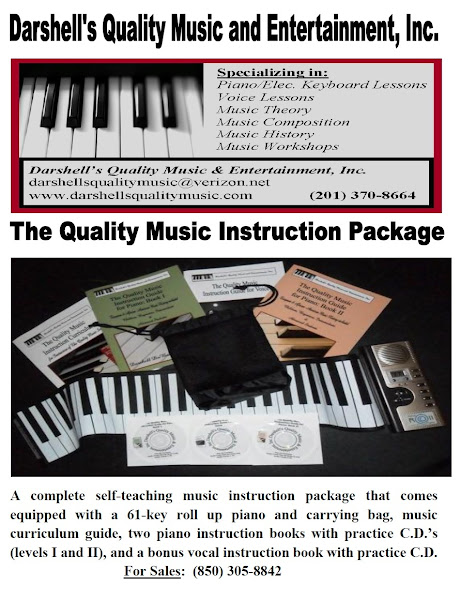A solid Music Education program trains its students in understanding Music History. History allows students to appreciate different styles of music. This is really important for composition students. Coupled with their understanding of theory, they can draw from various genres to create their own original styles.
Understanding the different time periods in Music History is very important because the students are able to see the progression of one style of music to the next. Also, the students will see the connection between styles and the events that occurred during different time periods. The students will see how historical events were and still are reflected in music. The following is a list of European time periods and the type of music that dominated during that time:
1.The Ancient Period (app.753 B.C.-336 A.D.) - Monophony (music having one voice)
2. The Medieval Period (app. 336-1500) - Polyphony (music having more than one voice)
3. The Renaissance Period (app. 1450-1600) - Musica Reservata (music that consists of various texts, sung simultaneously, that share the same sentiment)
4. The Baroque Period (app. 1600-1750) - Toccata (light, fast-moving piano composition), Fugues (composition with re-occurring themes in different voices), Preludes (usually a short introductory piece to a more complex composition)
5. The Classical Period (app. 1750-1827) - Sonata (composition consisting of three contrasting sections called the exposition, the development and the recapitulation)
6. The Romantic Period (1827-1900) - Program Music (music that moves emotions in order to create mental images or depict pictures in the imagination)
7. Music During the Early to Mid -Twentieth Century (1900-1951) - Impressionism (music that focuses on an atmosphere rather than arousing emotions using non-traditional methods), Expressionism (music that expresses intense emotions using non-traditional methods of writing)
Each type of music reflected the era in which it flourished. It took on its characteristics and told the story of events as they unfolded, making music a reflection of its time.
Thursday, August 13, 2009
A Controversial Title...or Not?
The following is a challenge to the title of my music curriculum, "The African-American Music Curriculum. Share your thoughts...
Geoffrey Grider
Hey...what exactly is an "African-American Music Instruction Guide"...?
August 9 at 9:25pm ·
Darshell Dubose-Smith
Hi Geoff. My publisher decided that since so many African-American schools in urban areas have eliminated their music programs due to budget cuts, titling it The African-American Music Instruction Guide would make my affordable music program more appealing to these schools. The information in the books can be used by anyone. As a matter of fact, because of the title, I've had a great deal of people (from various cultures) ask me the same question. Be blessed. Darshell
Tue at 4:03pm ·
Geoffrey Grider
So, are these schools that only accept and teach African-Americans? I don't understand the need for the racial distiction. I thought music was the universal langauge?? :)
Tue at 4:15pm ·
Darshell Dubose-Smith
It's not that these schools only accept and teach African-Americans, it's just the make-up of the communities therefore, the schools reflect the communities. Music is universal however, music history classes have not been. European music is usually the focus of study. This is something I argued when I studied music. So, in addition to European ... Read Moremusic history, I, also, incorporate music history by great African-Americans in my books and title it The African-American Music Instruction Guide in order to make it more appealing to a group of people that don't normally see their (our) history. Classical music is music that stands the test of time. Bach, Beethoven Brahms, etc. certainly had their place in music history...but so did Joplin, Basie, Ellington and more. Including the history of musicians that look like the people that make up the community doesn't stress racial distinctions it promotes self pride among people whose history has been repeatedly ommitted from the history books:)
Tue at 6:37pm ·
Geoffrey Grider
Well, I don't think we will ever truly get past the race "issue" as long as we keep creating distinctions, dont ya think? Because when people study classical music, its not called "Caucasian Music", right? I think we should group music by styles, and not by who and what "flavor" of person wrote it.
Tue at 7:32pm ·
Darshell Dubose-Smith
You're right, classical music is not called Caucasian Music, it's called European Music. However, if classical music is music that stands the test of time, then music by composers of other cultures should be included as well but historically that has never been the case. From your perspective, making this distinction is racial. From my ... Read Moreperspective, it's promoting a strong sense of self-worth that (for various reasons) was never put in place. Unlike other books, I don't omit music history of other cultures, I include it but I'm directing it to a group of people that haven't had the same opportunites of knowing their (our) history like other cultures have.
Tue at 11:46pm ·
Geoffrey Grider
Hey...what exactly is an "African-American Music Instruction Guide"...?
August 9 at 9:25pm ·
Darshell Dubose-Smith
Hi Geoff. My publisher decided that since so many African-American schools in urban areas have eliminated their music programs due to budget cuts, titling it The African-American Music Instruction Guide would make my affordable music program more appealing to these schools. The information in the books can be used by anyone. As a matter of fact, because of the title, I've had a great deal of people (from various cultures) ask me the same question. Be blessed. Darshell
Tue at 4:03pm ·
Geoffrey Grider
So, are these schools that only accept and teach African-Americans? I don't understand the need for the racial distiction. I thought music was the universal langauge?? :)
Tue at 4:15pm ·
Darshell Dubose-Smith
It's not that these schools only accept and teach African-Americans, it's just the make-up of the communities therefore, the schools reflect the communities. Music is universal however, music history classes have not been. European music is usually the focus of study. This is something I argued when I studied music. So, in addition to European ... Read Moremusic history, I, also, incorporate music history by great African-Americans in my books and title it The African-American Music Instruction Guide in order to make it more appealing to a group of people that don't normally see their (our) history. Classical music is music that stands the test of time. Bach, Beethoven Brahms, etc. certainly had their place in music history...but so did Joplin, Basie, Ellington and more. Including the history of musicians that look like the people that make up the community doesn't stress racial distinctions it promotes self pride among people whose history has been repeatedly ommitted from the history books:)
Tue at 6:37pm ·
Geoffrey Grider
Well, I don't think we will ever truly get past the race "issue" as long as we keep creating distinctions, dont ya think? Because when people study classical music, its not called "Caucasian Music", right? I think we should group music by styles, and not by who and what "flavor" of person wrote it.
Tue at 7:32pm ·
Darshell Dubose-Smith
You're right, classical music is not called Caucasian Music, it's called European Music. However, if classical music is music that stands the test of time, then music by composers of other cultures should be included as well but historically that has never been the case. From your perspective, making this distinction is racial. From my ... Read Moreperspective, it's promoting a strong sense of self-worth that (for various reasons) was never put in place. Unlike other books, I don't omit music history of other cultures, I include it but I'm directing it to a group of people that haven't had the same opportunites of knowing their (our) history like other cultures have.
Tue at 11:46pm ·
Subscribe to:
Posts (Atom)


